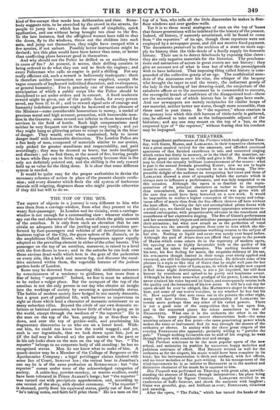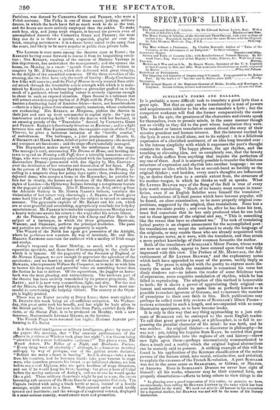THE THEATRES.
THE magnificent performance of the Puritani which took place on Tues- day, with GRISI, MARIO, and LABLACHE, in their respective characters, was a great musical revival for the amateurs, and afforded continual specimens of that finished excellence in solo and concerted singing which exists but dimly in memory, or in the ideal of the musician, un- til these great artists meet to verify and give it life. From this night may be dated the actually brilliant commencement of the season : what is past is the annual formula preceding Easter; now we are to begin music in earnest. GRISI has returned to us in fine song. The irre- pressible delight of the audience on recognizing her tones and those of LABLACHE showed a state of sympathy before the curtain which is always sure to influence a performance, and was duly responded to on this occasion. Although the opera is so familiar to the repre- sentatives of its principal characters as rather to be improvised than remembered, the music now performed was given with all the care that could have been bestowed on a new work. It would be impossible to realize a higher conception of the repose and volup- tuous effect of music than from the fine effects thrown off here without the least effort. Viewing the fair and accomplished prima donna with a critical eye, we should say that her present appearance announces in- creased embonpoint, with proportionable advance in the roundness and smoothness of her expressive singing. The fire of Gates performance and her uncommonly elegant and articulate passages are undiminished in their attraction ; but what now struck us as the perfection of vocal loveliness was the smooth progress from note to note which she dis- played in some little unostentatious warbling returns to the subject of her airs. Nothing so liquid and sweet was surely ever heard before. Although the part of Arturo does not afford that scope to the powers of MARIO which some others do in the repertory of modern opera, his opening scene is highly favourable both to the quality of his voice and his talent for expression. The melting tenderness of his tone, his fine feeling for music, the exquisite delicacy of his ear, his ornaments though limited in their range ever nicely applied and executed, are still his distinguished attractions. He delivers some of his phrases in a style so like that of GRISI that he might well pass for her pupil. The superb voice of LABLACHE, in which we might now expect to find some slight deterioration, is not a jot impaired, but still does honour by roundness and aplomb to its portly and handsome owner. Although he has been somewhat prodigal of his power, LABLACHE has never strained his voice beyond its limits, and consequently retains both the quality and the intonation of his low notes. It will be a sad day for opera should he ever be obliged, like MATHEWS'S singer in the steam- boat, and some of our native vocalists, to try whether he has lost his G. How superbly that note came out in the polacca the other night, many will bear witness. The fine musicianship of LABLACHE in- terests more perhaps than any other of his varied powers. There is not a good note of the composition that is lost upon him, and in the concerted pieces his talent assimilates to that of DaeooNETTI. What one is in the orchestra the other is on the stage. The same prodigious accent characterizes both—the same unerring seizure of any fine point—the same penetrating power which makes the voice or instrument find its way through the masses of the orchestra or chorus. In society with the three great singers of the evening FORNASARI also appeared; probably willing to " partake the gale." Though nothing favourable can be said of his singing, he went through his part with considerable zeal and energy. The Puritani continues to be the most popular opera of the new school, and maintains its position by numerous happy melodies and judicious contrasts of effect. Had BELLINI written as well for the orchestra as for the singers, his music would have been complete in its kind; but his instrumentation is thick and confused, with few effects, and no inner melodies or fine part-writing. In his management of the wind-instruments he is as inferior to Dor:me= as in the marked and distinctive character of his music he is superior to him. Don Pasquale was performed on Thursday with great eclat, notwith- standing the absence of Memo, through indisposition ; his place being creditably supplied by Signor CORELLI. LABLACHE revelled in an exuberance of buffo humour, and shook the audience with laughter ; Garai was graceful, gay, and brilliant as ever; FORNASARI, vivacious and amusing. After the opera, " The Polka," which has turned the heads of the
Parisians, was danced by Callum% GRIST and PERROT, who wore a Polish costume. The Polka is one of those smart, jerking, military dances, in which the heels have full as much work to do as the toes, and the knees are more actively employed than the ankles. To make such hop, skip, and jump steps elegant, is beyond the powers even of accomplished dancers like CanLorre GAM and PERROT ; the most they can do is to throw a quaint, coquettish, playful air over the brisk, romping movements: it is a dance better suited to the camp than the court, and likely to be more popular at public than private balls.



























 Previous page
Previous page